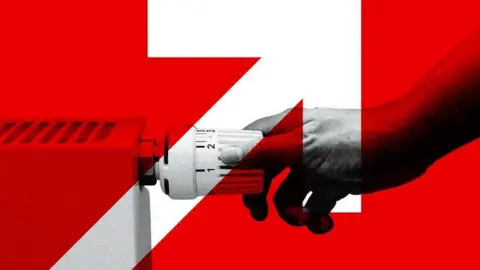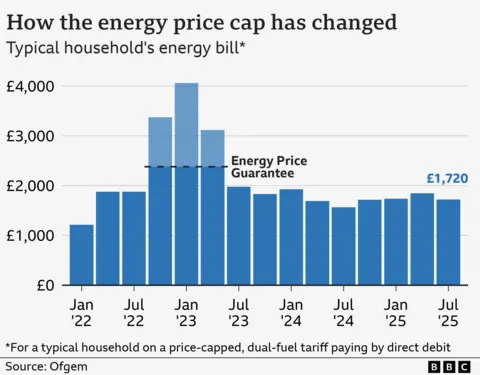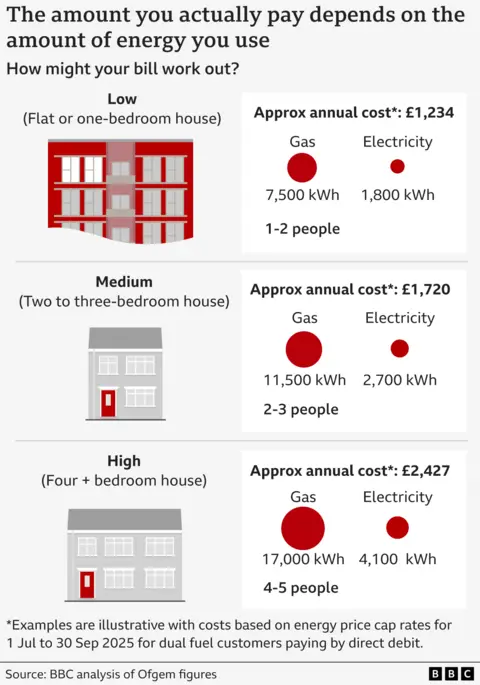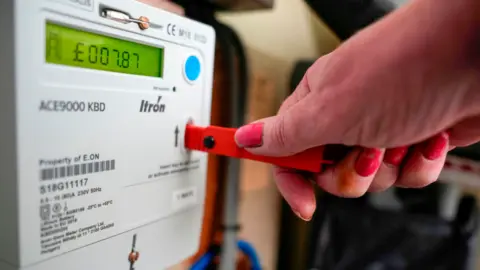 BBC
BBCGas and electricity prices are expected to rise slightly during the autumn and winter months, after a new energy price cap takes effect on 1 October.
The increase comes after a fall at the start of July, but there are concerns that bills remain unaffordable for some.
The energy price cap sets the maximum amount customers can be charged for each unit of energy, but actual bills depend on how much gas and electricity you use.
What is the energy price cap and how is it changing?
The energy price cap covers around 21 million households in England, Wales and Scotland and is set every three months by Ofgem.
It fixes the maximum price that can be charged for each unit of energy on a standard – or default – variable tariff for a typical dual-fuel household which pays by direct debit.
Since July, this has meant the annual bill for a dual-fuel direct debit household using a typical amount of energy has been £1,720 a year, down £129 a year on the previous cap.
Between 1 July and 30 September 2025, gas prices are capped at 6.33p per kilowatt hour (kWh) and electricity at 25.73p per kWh.

Those who pay their bills every three months by cash or cheque pay more, but those on prepayment meters pay a little less.
The cap does not apply in Northern Ireland, which has its own energy market.
What is a typical household?
Your energy bill depends on the overall amount of gas and electricity you use, and how you pay for it.
The type of property you live in, how energy efficient it is, how many people live there and the weather all make a difference.

The Ofgem cap is based on a “typical household” using 11,500 kWh of gas and 2,700 kWh of electricity a year with a single bill for gas and electricity, settled by direct debit.
The vast majority of people pay their bill this way to help spread payments across the year. Those who pay every three months by cash or cheque are charged more.
Should I take a meter reading when the energy cap changes?
Submitting a meter reading when the cap changes means you are not charged for estimated usage at the wrong rate.
This is especially important when prices go up.
Customers with working smart meters do not need to submit a reading as their bill is calculated automatically.
What is happening to prepayment customers?
About four million households had prepayment meters in January 2025, according to Ofgem.
Since 1 July, these customers have been paying slightly less than those on direct debit, with a typical annual bill of £1,672.
 Getty Images
Getty ImagesMany pre-payment meters have been in place for years, but some were installed more recently after customers struggled to pay higher bills.
Rules introduced in November 2023 mean suppliers must give customers more opportunity to clear their debts before switching them to a meter. They cannot be installed at all in certain households.
Can I fix my energy prices?
Fixed-price deals are not affected by the energy price cap, which changes every three months and can rise and fall.
They offer certainty for a set period – often a year, or longer – but if energy prices drop when you are on the deal, you could be stuck at a higher price. You may also have to pay a penalty to leave a fixed deal early if you change your mind.
Ofgem, the energy regulator, says customers who want the security of knowing what their bill will be should consider moving to a fixed deal. However, it says they should make sure they understand all the costs.
Martin Lewis, founder of Money Saving Expert, recommends checking whole-of-market energy price comparison sites to help find the best deal.
What are standing charges and how are they changing?
What help can I get with energy bills?
The Household Support Fund, which was introduced in September 2021 to help vulnerable customers, has been extended until March 2026.
The Warm Home Discount scheme is also being overhauled. From winter 2025, anyone on means-tested benefits will automatically see £150 taken off their bills, no matter what size of property they live in.
The government’s Fuel Direct Scheme can help people to repay an energy debt directly from their benefit payments.
In addition, suppliers must offer customers affordable payment plans or repayment holidays if they are struggling with bills.
Most suppliers also offer hardship grants.


